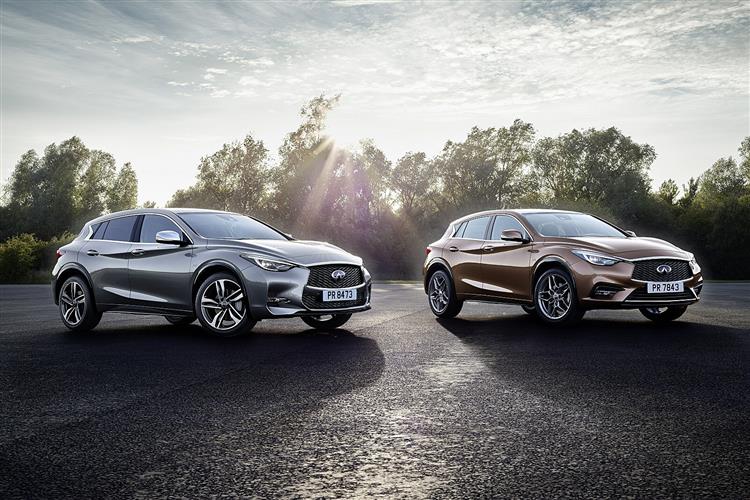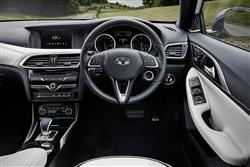B&Q (some text hidden) --NONE--
By Jonathan Crouch
Introductionword count: 96
Here's the car that was tasked with putting its Japanese luxury brand Infiniti on the map in Europe against brands like BMW. The Q30, which sold for five years from 2015, was the company first compact car, its first European-built model and in many ways, its first really credible segment-competitive contender. Which is just as well since this premium small hatch targeted tough rivals like Audi's A3, BMW's 1 Series and the car it was based upon, Mercedes' A-Class. It was a difficult brief this car ultimately failed in. But it might be canny used buy.
Modelsword count: 4
5dr family hatch (1.75-litre)
Historyword count: 484
Let's see if this is you. You need a used Focus-sized family hatch from the 2015-2020 period, but want a nicer, premium-badged one. Maybe you've tried the BMW 1 Series, Audi A3 and Mercedes A-Class models that almost everyone seems to have in this segment, but you'd like something a bit different. In seeking that, you've found a Volvo V40 a little dull and an Alfa Romeo Giulietta rather compromised. Were you to be such a customer, we'd probably point you towards the car we're looking at here, Infiniti's Q30. Of course, it's entirely possible that your route towards interest in this car has been nothing like as logically structured as that. Perhaps you've just seen a Q30, like the look of it and want to know whether it would make sense as an alternative to whatever more conventionally-branded model you're either driving or thinking of buying at the moment. Either way, it's quite likely that you know little or nothing about Infiniti - so we'll start there. This is Nissan's luxury brand, founded in 1989, the same year that Toyota created Lexus to fulfil the same purpose. Lexus of course, quickly became a worldwide nameplate, but Infiniti initially stayed focused on lucrative luxury markets like the US and the Middle East. By the early 2000s, the brand had lazily drifted into simply re-badging Nissan models and was nearly scrapped before Nissan Motors President Carlos Ghosn developed a business strategy that would give the company its own identity, push it properly up-market and launch it into Europe. That took time. It wasn't until 2009 that Infiniti was introduced into the UK and even then its impact was tiny thanks to a miniscule dealer network and a pricey product range that prioritised thirsty petrol power. Even worse, there were no compact affordable volume models to drive sales. Things gradually picked up after that though, first with the 2013 launch of the brand's more accessible BMW 3 Series-sized Q50 saloon and then, more significantly, with the introduction of this smaller Q30 hatch in the Autumn of 2015. The Q30 was the company's first European-made product, built at Nissan's UK factory in Sunderland alongside the Nissan Qashqai model whose underpinnings you'd expect it to copy given that Infiniti didn't have either the time or the money to develop this car from scratch. Actually though, this design's fundamentals come from an altogether different and entirely more appropriate source, Nissan's alliance with Daimler allowing the Q30 to be based very heavily on one of the key contenders it had to beat, the Mercedes A-Class. From this starting point though, Infiniti tried to create a more individual end result in terms of the styling, the cabin feel and the driving experience. It's an unlikely confection and ultimately, it didn't work because Infiniti pulled out of Europe in 2019. But does it make sense as a used buy? Let's find out.
What You Getword count: 343
Visually, this car simply had to offer something different in its segment if it was to have any chance at all of making sales headway against the established opposition. Fortunately, it did. Styled at Nissan's Paddington design studio in London, the Q30's shape is a riot of dramatic curves and turbulent lines, enabling it to stand out in a way that makes German prestige-branded rivals look very conservative indeed. And inside? Is it as stylish and eye-catching in the cabin as the exterior panelwork suggests that it might be? No. Still, it's pretty nice all the same. We particularly like the brilliant 'spinal support' seats, designed to match the curvature of your back and reduce fatigue on long journeys by up to 30%. Nor are you stuck with the kind of centre dash infotainment screen that on a rival MK3 A-Class from this era looks like an iPad glued to the fascia as an after-thought. Here, the 7-inch colour display provided is beautifully built in to the flowing curves of the dash top and proves to be usefully informative, with Bluetooth 'phone and audio functions easy to operate using either voice, touch or an intuitive controller behind the gear lever. In the back, the curve of the rear side windows and the amount that the rear wheel arches intrude into the door openings mean that getting in isn't quite as easy as it would be in a more conventional Focus-sized C-segment hatch, though the process is helped by the way that the doors open right out to 90-degrees. It's also pretty snug once you get yourself installed inside. Two modestly-proportioned folk should be fine though - and on plusher models they'll be served by this fold-down centre armrest with its neat-clip-out cup holders. On to the boot. The 368-litre capacity total is a little more than you'd get in a MK3 A-Class, quite a lot more than you'd get in a Volvo V40 or Alfa Giulietta but directly comparable with the room on offer from an Audi A3 or a BMW 1 Series.
To see the full road test text contact us on 0330 0020 227
Pictures (high res disabled)

.jpg)
|
.jpg)
|
.jpg)
| |||
.jpg)
|
.jpg)
|
.jpg)
| |||

|
Scoring (subset of scores)
Category: Compact Family Cars
| Performance | |
| Handling | |
| Comfort | |
| Space | |
| Styling, Build, Value, Equipment, Depreciation, Handling, Insurance and Total scores are available with our full data feed. | |



